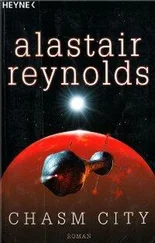“And Sajaki’s response was?”
“That I should discontinue the experiments, at least until we’d arrived around Yellowstone. Let Nagorny spend a few years in reefersleep, and see if that cured his psychosis. I was welcome to continue tinkering with the gunnery, but I wasn’t to put Nagorny in the seat again.”
“Sounds like very reasonable advice to me. Which of course you disregarded.”
She nodded, paradoxically relieved that the Captain had guessed her crime, without her having to spell it out.
“I woke a year ahead of the others,” Volyova said. “To give me time to oversee the system and keep an eye on how you were doing. That was what I did for a few months, too. Until I decided to wake Nagorny as well.”
“More experiments?”
“Yes. Until a day ago.” She sucked hard on the cigarette.
“This is like drawing teeth, Ilia. What happened yesterday?”
“Nagorny disappeared.” There; she’d said it now. “He had a particularly bad episode and tried to attack me. I defended myself, but he escaped. He’s elsewhere in the ship. I have no idea where.”
The Captain pondered this for long moments. She could tell what he must be thinking. It was a big ship and there were whole regions of it through which nothing could be tracked, where sensors had stopped working. It would be even harder trying to find someone who was actively hiding.
“You’re going to have to find him,” the Captain said. “You can’t have him still at large when Sajaki and the others awaken.”
“And then what?”
“You’ll probably have to kill him. Do it cleanly, and you can put his body back in the reefersleep unit and then arrange for the unit to fail.”
“Make it look like an accident, you mean?”
“Yes.” There was, as usual, absolutely no expression on the part of the Captain’s face she could see through the casket window. He was no more capable of altering his expression than a statue.
It was a good solution—one that, in her preoccupation with the nature of the problem, she had failed to devise herself. Until then, she had feared any confrontation with Nagorny because it might put her in the position of having to kill him. Such an outcome had seemed unacceptable—but as always, no outcome was unacceptable if you looked at it the right way.
“Thank you, Captain,” Volyova said. “You’ve been very helpful. Now—with your permission—I’m going to cool you again.”
“You’ll be back again, won’t you? I do so enjoy our little conversations, Ilia.”
“I wouldn’t miss them for the world,” she said, and then told her bracelet to drop his brain temperature by fifty millikelvin; all it would take to send him to dreamless, thoughtless oblivion. Or so she hoped.
Volyova finished her cigarette in silence and then looked away from the Captain, along the dark curve of the corridor. Somewhere out there—somewhere else in the ship—Nagorny was waiting, bearing her what she knew to be the deepest of grudges. He was ill himself now; sick in the head.
Like a dog that had to be put down.
“I think I know what it is,” Sylveste said, when the last obstructing block of stone had been removed from the obelisk’s cladding, revealing the upper two metres of the object.
“Well?”
“It’s a map of the Pavonis system.”
“Something tells me you’d already guessed that,” Pascale said, squinting through her goggles at the complex motif, which resembled two slightly offset groups of concentric circles. Stereoscopically merged, they fell into one group which seemed to hang some distance above the obsidian. And they were planetary orbits; no doubt of that. The sun Delta Pavonis lay at the centre, marked with the appropriate Amarantin glyph—a very human-looking five-pointed star. Then came correctly sized orbits for all the major bodies in the system, with Resurgam marked with the Amarantin symbol for world. Any doubts that this was just a coincidental arrangement of circles was banished by the carefully marked moons of the major planets.
“I had my suspicions,” Sylveste said. He was fatigued, but the night’s work—and the risk—had surely been worthwhile. It had taken them much longer to unearth the second metre of the obelisk than the first, and at times the storm had seemed like a squadron of banshees, only ever a moment away from inflicting shrieking death. But—as had happened before, and would certainly happen again—the storm had never quite reached the fury that Cuvier had predicted. Now the worst of it was done, and though streaks of dust were still rippling in the sky like dark banners, pink dawnlight was beginning to chase away the night. It seemed they had survived after all.
“But it doesn’t change anything,” Pascale said. “We always knew they had astronomy; this just shows that at some point they discovered the heliocentric universe.”
“It means more than that,” Sylveste said, carefully. “Not all of these planets are visible to the naked eye, even allowing for Amarantin physiology.”
“So they used telescopes.”
“Not long ago you described them as stone-age aliens. Now you’re ready to accept that they knew how to make telescopes?”
He thought she might have smiled, but it was hard to tell when she wore the breather mask. Instead, she looked skywards. Something had crossed between the baulks; a bright deltoid moving under the dust.
“I think someone’s here,” she said.
They climbed the ladder quickly, out of breath when they reached the top. Though the wind had lessened from its peak of several hours earlier, it was still an ordeal to move around topside. The dig was in disarray, with floods and gravitometers toppled and broken, equipment strewn around.
The aircraft was hovering above them, veering to and fro as it scouted landing sites. Sylveste recognised it immediately as one of Cuvier’s; Mantell had nothing as large. Aircraft were in short supply on Resurgam: the only means of crossing distances more than a few hundred kilometres. All the aircraft in existence now had been manufactured during the early days of the colony by servitors working from local raw materials. But the constructional servitors had been destroyed or stolen during the mutiny, and consequently the artefacts they had left behind were of incalculable value to the colony. The aircraft regenerated themselves if they were involved in minor accidents, and never needed maintenance—but they could still be ruined by sabotage or recklessness. Over the years the colony had steadily depleted its supply of flying machines.
The deltoid hurt his eyes. The underside of the plane’s wing was sewn with thousands of heat elements which glowed white-hot, generating lift thermally. The contrast was too much for Calvin’s algorithms.
“Who are they?” one of his students asked.
“I wish I knew,” Sylveste said. But the fact that this plane had originated in Cuvier entirely failed to cheer him. He watched it lower, casting actinic shadows across the ground before the heat elements slid down the spectrum and the plane settled onto skids. After a moment a ramp folded out and a cluster of figures trooped from the plane. His eyes snapped to infrared—he could see the figures clearly now, even as they moved away from the plane towards him. Clad in dark clothes, they wore breather masks, helmets and what looked like strap-on armour, flashed with the Administration insignia: the closest the colony came to a fully-fledged militia. And they were carrying things—long, evil-looking rifles held in double-grips, with a torch slung under each barrel.
“This doesn’t look good,” Pascale said, accurately.
The squad halted a few metres from them. “Doctor Sylveste?” called a voice, attenuated by the wind, which was still considerable. “I’ve got some bad news, I’m afraid, sir.”
Читать дальше












